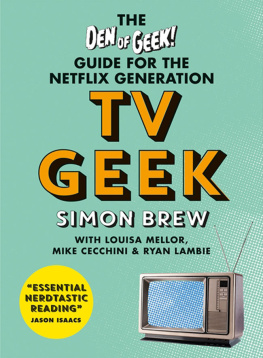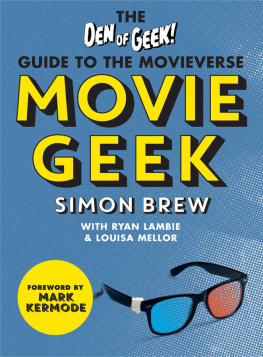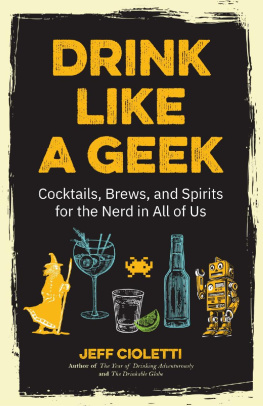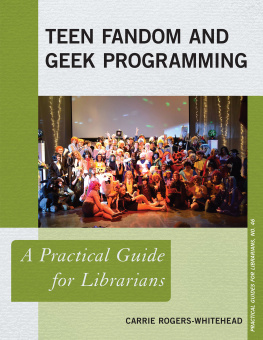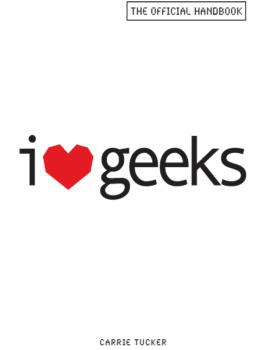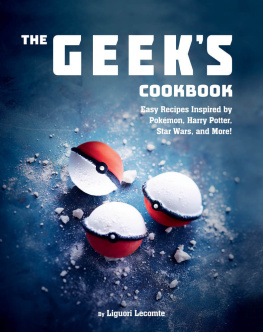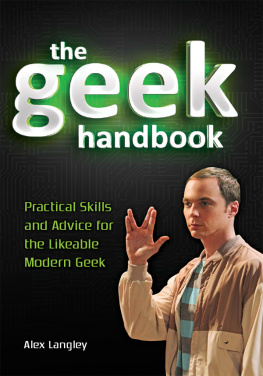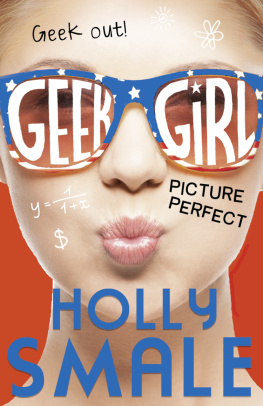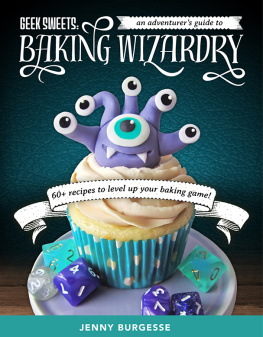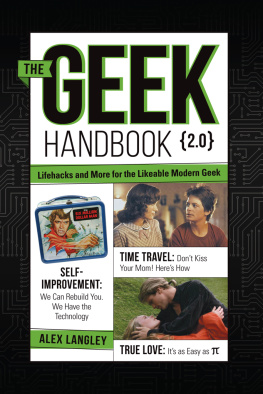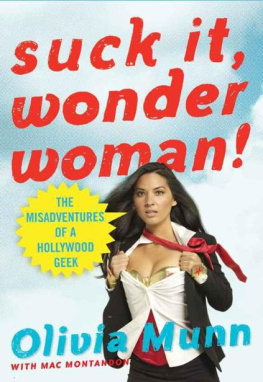
CONTENTS
HOW TO USE THIS EBOOK
Select one of the chapters from the and you will be taken straight to that chapter.
Look out for linked text (which is blue) throughout the ebook that you can select to help you navigate between related sections.
You can double tap images and tables to increase their size. To return to the original view, just tap the cross in the top left-hand corner of the screen.
WELCOME!
TELEVISION CHANGED IN THE LATE 1990S. THE SIZE OF IT, THE VISUAL QUALITY OF IT. AND THE STUFF THAT WAS BEING SHOWN ON IT.
In came what became known as the HBO revolution, as shows such as Oz and The Sopranos heralded whats already regarded as a golden era of American television drama. In the UK, meanwhile, genre TV shows were starting to seep into the mainstream. Previously, just getting a decent regular slot for shows such as Quantum Leap, Star Trek and Red Dwarf was a challenge. By the end of the 2000s, primetime British television was bursting with sci-fi, fantasy and genre shows, with the phenomenally successful revival of Doctor Who leading the charge.
Almost by coincidence, the Den of Geek website launched in the midst of all of this. From the moment the site went live back in April 2007, keeping on top of an avalanche of quality TV has been a delightful challenge. But whats been notable whether Den of Geek is your web friend of choice or not is how the changes in television were accompanied by a more obvious and vocal audience. All of a sudden, if you wanted to discuss a show, you didnt need to meet people in person or write into a magazine. You could do it there and then. Then Twitter came along, with things like hashtags and opinions. Just keeping on top of some of the, er, disagreeing views in the comments section of the website has been a challenge. When social media gets involved one overnight TV show can instantly feel like a drop-everything-because-you-must-see-it-moment. Ironically, at a point when television can be watched almost anywhere and at any time, theres still something really rather of-the-moment about it. And an awful lot to digest.
In our previous, competitively priced, non-award-winning and pivotally still available Movie Geek book, we explored in terrifying detail some of the stories behind nerdy-leaning films. Even before we got to the end of writing that particular tome, we realized that television particularly the TV of the late 1990s onward, where we focus much of our attention was an equally rich area for a book.
So we wrote one. And thankfully, you appear to be reading it. Thank you. A lot.
What weve tried to cover here is the shift in television thats taken place from the late 1990s through to DVD collections that required umpteen trips to IKEA to house, right up to the rise and dominance of streaming services. Weve done it more by looking at the shows themselves than the technology, but what weve found is that certain shows have in turn fuelled changes in the way people watch TV. Would Stranger Things have been such a huge hit if it didnt land all in one go? Did DVD season collections help fuel interest in shows such as The Sopranos? And would anyone in the UK have become obsessed with childrens TV hit The Mysterious Cities of Gold in the 1980s had it not run every week for the best part of a year?
Theres much to chew on, and it would be remiss of me not to plug our multi-award-losing website before I stop. Youll find it at www.denofgeek.com. In the meantime, on behalf of the Den of Geek scribes whose words youre about to read mine, Louisa, Ryan, Mike, Alec, Jenny, Kayti and Sarah thanks for indulging us so far. And we hope what youre about to read gives you an even longer to-watch list

SIMON BREW
@simonbrew
GEEKS VS LONELINESS
JUST WHILE WEVE GOT YOU, ONE OTHER LITTLE THING WED LIKE TO CHAT ABOUT
On 11 August 2014, as you probably know, the much-loved actor, comedian and human being Robin Williams took his own life. In the years that followed, more details have come to the fore, and its a sad, sad story. One of the factors in there is the depression that Williams had been battling throughout his life.
To try to find a positive in the midst of such a tragedy, Den of Geek launched Geeks Vs Loneliness, a weekly series that used the audience were lucky to have to talk about things that may be affecting some of us, or people we know. You can find the full archive here: www.denofgeek.com/uk/geeks-vs-loneliness.
But for the purposes of right here, right now: if youre in a tough place in your life, if youre struggling, if youre feeling lonely, even if something just doesnt feel quite right, please talk to someone. A common theme throughout all of our articles is that things tend to get better only when you let things out, and tell another person. A family, a friend, a stranger on an internet comment board, a Samaritan: please, find a way to stop internalizing your pains, and let other human beings help you.
Life is inevitably a lot, lot more complicated than the above paragraph makes it sound. But please know there are people rooting for you, however lonely you feel, and however dark the world looks. Stay awesome, and thank you for reading.


ASSORTED INSPIRATIONS FOR TELEVISION SHOWS
Where do the creators of TV shows get their ideas? The answer is everywhere and anywhere and in one case, at the seaside with bags of banknotes!

BREAKING BAD
Vince Gilligan, the creator of Breaking Bad, had built a name for himself penning episodes of The X-Files and the script for what eventually became the Will Smith movie Hancock. In 2005, however, Gilligan felt that work was drying up. Bemoaning this fact with his friend and future Breaking Bad writer, Tom Schnauz, the pair began joking about career options should they be greeters at Walmart, perhaps, or stick a meth lab in the back of an RV and drive around cooking up crystal meth? The throwaway comment stuck with Gilligan, and one of the finest television dramas of all time was born.


One single throwaway remark led to the creation of one of the most acclaimed TV shows of its era: Breaking Bad.
EVERYBODY LOVES RAYMOND
Theres a credit at the end of every episode of enduring sitcom Everybody Loves Raymond that simply reads based on the comedy of Ray Romano. Its an unusual but accurate acknowledgement. Romano had worked as a stand-up comedian, using material loosely based on his life, his family and his marriage. In collaboration with Phil Rosenthal, that stand-up work gradually developed into the outline for a TV show. With no single source to cite, Romanos earlier career got the credit!

